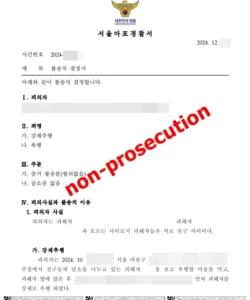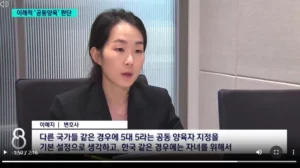Asset Protection in property division during divorce: Tips for High-Earning Expats. Divorce in Korea: Legal Realities Every Foreigner Must Know
Are you a high-income foreigner working in Korea’s finance sector—investment banking, private equity, or asset management—and considering divorce?
If so, understanding how Korea’s legal system handles asset division and custody is essential. Unlike community property states like California, Korea follows a separate property regime, which can lead to intense legal disputes over property and custody.
Kristen Lee, she has represented numerous clients in complex divorce cases involving doctors, bankers, and global executives. Kristen Yeji Lee is now partner of one of Korea’s prestigous law firms, supported by hundreds of attorneys and staff. The firm includes former chief judges from Korea’s family, civil, and criminal courts—ensuring unmatched insight and strategic strength for every case. With these expanded resources, Kristen is now more equipped than ever to serve international clients in high-stakes family law matters.
Key Considerations for Asset Protection in property division during divorce
Table of Contents
1. Legal Grounds for Divorce
Civil Act Article 840 outlines acceptable grounds for judicial divorce, including:
Adultery
Abandonment
Abuse or serious mistreatment
Irretrievable breakdown of the marriage
Prolonged disappearance (over 3 years)
Other serious reasons making marital continuation impossible
Practical Criteria Considered by Courts:
Degree of fault and responsibility
Length and quality of the marriage
Welfare of children
Possibility of reconciliation
2. Asset Division Principles
Civil Act Article 839-2 allows either spouse to claim a portion of marital property. Korea does not assume joint ownership but evaluates contributions to asset formation.
Key Factors Courts Consider:
Financial and Non-Financial Contributions
Salary, business income
Homemaking, childcare, emotional support
Origin of Assets
Pre-marriage or inherited assets are typically excluded unless significantly enhanced through mutual effort
Debt Allocation
Debts acquired for family living are generally shared
Private Settlement Agreements
Courts consider the fairness and presence of negotiation in private asset division deals
Common Court Ratios:
50:50 or 60:40 splits are common if one spouse focused on childcare
70:30 or 80:20 if one party brought significant pre-marital assets
What Sets High-Income Divorce Cases Apart?
Foreign professionals in finance should pay particular attention to:
Treatment of bonuses, stock options (RSUs), and international pensions
Cross-border tracing of hidden or international assets
Custody disputes involving international relocation
Disclosures of global real estate and foreign accounts
Without expert legal counsel, defending substantial wealth during a Korean divorce is extremely difficult.
Why Evidence and Narrative Matter
Korean courts are evidence-driven. Emotional claims aren’t enough. You’ll need:
Financial records
Travel and communication logs
Email/text evidence
Narrative also plays a critical role. Judges want to understand your lived experience in the marriage, not just financial facts.
International Marriages: No Exceptions
Being in a multinational marriage or working abroad does not entitle you to leniency. In fact, you may face more scrutiny due to:
Jurisdictional conflicts
Language and procedural barriers
Evidence across multiple legal systems
Case Highlight: $20 Million Asset Division Dismissed
In a recent case handled by Kristen Lee, a $20 million claim for asset division was completely dismissed after the court ruled against granting divorce. The takeaway? Early strategy wins cases.
Final Thoughts
For high-income foreign professionals in Korea, divorce isn’t just emotional—it’s a complex legal and financial chess game. Expert legal support from a seasoned international divorce attorney in Seoul can mean the difference between victory and financial vulnerability.
FAQ: Divorce for Foreigners in Korea
Q1. Can a foreigner file for divorce in Korea?
Yes. If you or your spouse reside in Korea, you can file. But choice of law and jurisdiction depend on nationality, marriage registration, and residence.
Q2. Is adultery required to get divorced in Korea?
No. Divorce is possible based on abuse, neglect, or breakdown of marriage. However, strong evidence is crucial.
Q3. Are overseas earnings and foreign assets divided?
Yes, if acquired during marriage. That includes RSUs, bonuses, and pensions—even abroad.
Q4. Can I take my child abroad post-divorce?
Possibly. Courts evaluate the child’s welfare, schooling, age, and parental care. International relocation is complex and requires legal planning.
Q5. Will a Korean divorce judgment be recognized overseas?
Generally, yes. Most countries recognize Korean divorce rulings if they meet service and due process standards.
Q6. Is a mutual divorce (settlement) possible?
Yes, if both sides agree on all terms. Foreigners may require notarized and translated documents.
Q7. Do I really need a divorce lawyer?
Yes—especially as a foreigner or high-income spouse. Mistakes can lead to severe financial and custodial outcomes.
Schedule a confidential consultation with Kristen Lee, a leading divorce lawyer in Seoul trusted by global clients.




